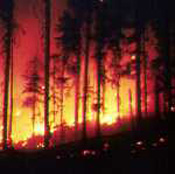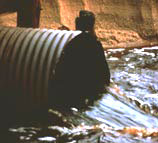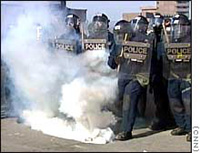
News |
- RCMP Slammed Over Quebec Summit
- B.C. Fires Made Worse By Communication
- UK Enlists Help To Predict Climate
- Abitibi Make Grassy Narrows An Offer
- Polluters Should Pay, Top Court Rules
- Canada and Nunavut Sign Climate Change Agreement
- Devils Lake Battle Could Head To Court
- Ontario Seeks Quebec Transmission Line
- Deficit Won't Affect New Hydro Building
- Canada Enforces Pollution Regulations?
- Manitoba Wildlands Files Questions For Hydro To Answer
- Pimicikamak Motions Dismissed
B.C. Fires Made Worse By Communication |
20 November 03 |
 An inquiry into this summer's forest fires in the Interior of British Columbia has been told poor communications created more problems than already existed. Former Manitoba premier Gary Filmon is touring B.C. looking for public input into a review on the summer's wildfire crisis. An inquiry into this summer's forest fires in the Interior of British Columbia has been told poor communications created more problems than already existed. Former Manitoba premier Gary Filmon is touring B.C. looking for public input into a review on the summer's wildfire crisis.The mayor of the town of Ashcroft, Andy Kormendy, said information at the emergency program office in Kamloops conflicted with what was actually happening on the ground. He says the B.C. Highways Department had closed roads, but he was told at the emergency office there were no closures. A similar complaint was made by a volunteer firefighter in Barriere who says the chain of command was not clear, that no single person was in charge of the firefighting effort near the community. The McLure-Barriere fire destroyed a local mill and more than 75 homes in August. The B.C. Wildlife Federation suggested the commission examine more aggressive tree spacing, controlled burns to reduce forest fuels, and guidelines for the storage of fire retardant as ways of reducing the damage from wildfires. The Filmon report is set to be completed by February 15. Visit the 2003 B.C. Firestorm Provincial Review web site Source: CBC.ca |
|
UK Enlists Help To Predict Climate |
18 November 03 |
 A massive worldwide online effort to predict how the global climate will change this century is being launched in the UK. A massive worldwide online effort to predict how the global climate will change this century is being launched in the UK.Computer users anywhere on Earth can join by downloading a climate model from a website. The organizers say it will be the world's largest climate prediction experiment. They hope it will result in a much more robust picture of the probable future climate. They expect it to generate "the world's most comprehensive probability-based forecast of 21st-century climate". Any computer user can take part by visiting the climate prediction website. Each will then run a unique version of the Met Office's climate model, simulating several decades of global climate at a time. The model will run as a background process on ordinary desktops without affecting other computing tasks. The results will go back to the organisers on the internet when the experiment ends. The simulations of present climate and past changes will be used to test different versions of the model, and the most realistic will be used to predict the century's climate. Dr Myles Allen, of the University of Oxford, said: "Together, participants' results will give us an overall picture of how much human influence has contributed to recent climate change, and of the range of possible changes in the future." The experiment is possible only because the climate models designed a few years ago to run on the world's best supercomputers can now work on any up-to-date personal computer. Visit ClimatePrediction.net online Source: BBC News |
|
Abitibi Make Grassy Narrows An Offer |
17 November 03 |
 Abitibi Consolidated has put an offer on the table for the consideration of Grassy Narrows First Nation. Abitibi Consolidated has put an offer on the table for the consideration of Grassy Narrows First Nation. "We listened to the offer and now we'll take it back for community consultation," said acting Deputy Chief, Steve Fobister. "It would be premature to say anything else." Abitibi senior official Don Hopkins and entourage met with Fobister and other members of the community of Grassy Narrows, on November 11, 2003, in Kenora. Hopkins presented a one page, pre-written document that Abitibi calls "A partnership proposal". Almost a year has passed since the blockade at Grassy Narrows went up to protest Abitibi's logging in Grassy Narrows traditional territory. The blockade will stay in place until this issue is resolved. Community members have been living on the land in a road blockade, since December 3rd, 2002, in protest of the devastating logging activities of Abitibi-Consolidated. Clearcutting for the Kenora mill threatens to wipe out what's left of the mature forest on Grassy Narrows traditional land. The deforestation currently taking place is having a significant and direct impact on their Treaty and Aboriginal Rights. Download the November 14, 2003 Sacramento Bee article: Newsprint Maker Offers Deal To End Clear-cutting Fight (DOC) |
|
Polluters Should Pay, Top Court Rules |
17 November 03 |
 In what is being called one of the biggest victories for environmental law in Canadian history, the Supreme Court delivered a ringing endorsement October 30, 2003 of the "polluter-pay" principle. In what is being called one of the biggest victories for environmental law in Canadian history, the Supreme Court delivered a ringing endorsement October 30, 2003 of the "polluter-pay" principle.The court ruled unanimously that former Quebec environment minister Paul Begin was fully within his powers in ordering Imperial Oil to clean up the site of a fuel depot it owned for more than half a century. "The minister has the responsibility of protecting the public interest in the environment and must make his decisions in consideration of that interest." The ruling has implications across the country, said Beatrice Olivastri of Friends of the Earth, an intervener in the case."This decision will affect how the more than 30,000 contaminated sites in Canada will be dealt with," she said. The court judgment goes beyond the specifics of the Imperial case to underline growing public concern about the environment; "It may also be evidence of an emerging sense of inter-generational solidarity and acknowledgment of an environmental debt to humanity and to the world of tomorrow," the court said. Jerry DeMarco of Sierra Legal Defence Fund, which represented Friends of the Earth in the case, said the ruling enhances the Supreme Court's excellent record on environmental issues. "We believe this will be considered one of the great environmental law victories in Canadian judicial history," he said. Olivastri said Imperial is currently involved in a similar controversial legal proceeding over alleged lead contamination of a residentialdevelopment at Lynnview Ridge in Calgary. Visit the Friends of the Earth web site Visit the Sierra Legal Defence Fund web site Sources: Northwatch, Canadian Press |
|
Canada and Nunavut Sign Climate Change Agreement |
6 November 03 |
 Canada's Environment Minister, along with Nunavut's Minster for Sustainable Development and Minister of Energy signed a Memorandum of Understanding (MOU) for Co-operation on Addressing Climate Change in Iqaluit, Nunavut on October 31, 2003. The Federal/Provincial/Territorial MOU is the first of its kind since the ratification of the Kyoto Accord last year. There is no such agreement yet in place between Manitoba and the Government of Canada. Canada's Environment Minister, along with Nunavut's Minster for Sustainable Development and Minister of Energy signed a Memorandum of Understanding (MOU) for Co-operation on Addressing Climate Change in Iqaluit, Nunavut on October 31, 2003. The Federal/Provincial/Territorial MOU is the first of its kind since the ratification of the Kyoto Accord last year. There is no such agreement yet in place between Manitoba and the Government of Canada.The MOU represents an agreement to explore cooperation in areas such as climate change and education, energy efficiency and the development of renewable and alternative energy programs. In addition, the governments will explore cooperation to advance knowledge of climate change impacts and adaptation strategies in Nunavut through Inuit Qaujimajatuqangit (traditional knowledge) and research; and support plan Northern and multilateral initiatives related to emission reduction and adaptation. As Nunavut Energy Minister, the Honourable Ed Picco noted, "No other jurisdiction has seen climate change in actuality in the way that Nunavut has . . . This innovative MOU will work in concert with our pro active efforts on alternative energy, our sustainable approaches, as well as the reduction of our greenhouse emissions." View the Government of Canada News Release View the Nunavut Climate Change MOU |
|
Canada Enforces Pollution Regulations? |
29 October 03 |
 The international agency responsible for monitoring Canada's environmental performance, under NAFTA, the Commission for Environmental Cooperation (CEC), released a preliminary ruling October 23, 2003 recommending that a public investigation be launched into the lax enforcement of anti-pollution laws against Canada's pulp and paper industry. The international agency responsible for monitoring Canada's environmental performance, under NAFTA, the Commission for Environmental Cooperation (CEC), released a preliminary ruling October 23, 2003 recommending that a public investigation be launched into the lax enforcement of anti-pollution laws against Canada's pulp and paper industry. "The CEC Secretariat's recommendation validates our clients' concerns about the abysmal enforcement of anti-pollution laws against the pulp and paper industry," said Sierra Legal Defence Fund lawyer Robert Wright. "A full investigation is needed to determine why the federal government turned a blind eye to certain pulp and paper mills in central and eastern Canada and allowed them to violate federal laws with impunity for more than a decade." Submitted on behalf of national and local environmental groups from Ontario, Quebec, New Brunswick, Nova Scotia and Newfoundland and Labrador, the 2002 complaint asserts that that the federal government has failed to enforce the Fisheries Act and the 1992 Pulp and Paper Effluent Regulations for mills in Ontario, Quebec and the Atlantic provinces - despite documentation of more than 2,400 violations of federal laws self-reported by the mills over a five-year period. The Secretariat's recommendation highlights concerns that the federal government failed to use the full range of compliance and enforcement tools at its disposal and asks for a full investigation into twelve mills of particular concern, including Tembec's mill in Témiscaming, Québec and the Irving mill in Saint John, New Brunswick. "A full investigation by the CEC will identify why the federal government failed to use all the available enforcement tools even though they were blatantly aware of the industry's chronic violators," said Beatrice Olivastri, chief executive officer of Friends of the Earth Canada. "If the feds are not prosecuting violations that are acutely lethal, then what else are they ignoring? We want to shine a spot light on these enforcement issues so that the federal government will more effectively and equitably enforce the regulation of this and other sources of pollution." Visit the Commission for Environmental Cooperation web site Visit the Sierra Legal Defence Fund web site Source: Sierra Legal Defence Fund, Friends of the Earth Canada |
|
Manitoba Wildlands Files Questions For Hydro To Answer |
17 October 03 |
 Friday October 17, 2003 is the deadline to file format written questions - called interrogatories, for the proponent to answer regarding the Wuskwatim generation and transmission projects. Manitoba Wildlands, CNF filed over 300 questions regarding: Friday October 17, 2003 is the deadline to file format written questions - called interrogatories, for the proponent to answer regarding the Wuskwatim generation and transmission projects. Manitoba Wildlands, CNF filed over 300 questions regarding:
Manitoba has not made a decision to build a dam in almost 20 years. Previous dams did not receive environmental assessment through a public process. The proposed Wuskwatim project contains a low head dam with 3 transmission line segments. It will provide 200 megawatts of power each year. Recent conservation programming in Manitoba saves about 250 megawatts of power, enough for a 'virtual dam.' Download the October 17, 2003 Manitoba Wildlands Press Release |
|
Pimicikamak Motions Dismissed |
16 October 03 |
 Manitoba's Clean Environment Commission (CEC) dismissed the motion requesting an expanded environmental review of the Wuskwatim projects in a ruling released October 6, 2003. The ruling reconfirmed that the terms of reference for the review will be applied widely by the CEC panel, including in respect to cumulative assessment of impacts from the projects. The CEC also confirmed that Manitoba Hydro will be expected to provide complete information to fulfill the intent of the Wuskwatim projects environmental impact statement guidelines. Manitoba's Clean Environment Commission (CEC) dismissed the motion requesting an expanded environmental review of the Wuskwatim projects in a ruling released October 6, 2003. The ruling reconfirmed that the terms of reference for the review will be applied widely by the CEC panel, including in respect to cumulative assessment of impacts from the projects. The CEC also confirmed that Manitoba Hydro will be expected to provide complete information to fulfill the intent of the Wuskwatim projects environmental impact statement guidelines.On the Pimicikamak motion regarding deficiencies in the Manitoba Hydro environmental filings to date the CEC made it clear that all formal written questions posed to the public utility by public participants during the upcoming rounds of interrogatories will be answered fully. The environmental panel formally dismissed this motion also. Environmental organizations and Indigenous communities in northern Manitoba, participants in the licensing process, supported the Pimicikamak motions during a formal hearing on September 30 where the CEC heard oral arguments regarding these motions. Visit the CEC web site Download the CEC October 6, 2003 Ruling (DOC) |
|


 RSS Feeds:
RSS Feeds: A tactical troop of the RCMP working at the Summit of the Americas Conference in Quebec City displayed "oppressive" and "disgraceful" conduct toward harmless protesters, a new report charges. Shirley Heafey, chairwoman of the Commission for Public Complaints Against the RCMP, wrote the 15-page interim report in response to a formal complaint by NDP Member of Parliament Svend Robinson.
A tactical troop of the RCMP working at the Summit of the Americas Conference in Quebec City displayed "oppressive" and "disgraceful" conduct toward harmless protesters, a new report charges. Shirley Heafey, chairwoman of the Commission for Public Complaints Against the RCMP, wrote the 15-page interim report in response to a formal complaint by NDP Member of Parliament Svend Robinson. The Manitoba government is considering launching a legal challenge against the project to divert water from Devils Lake, North Dakota to Manitoba.
The Manitoba government is considering launching a legal challenge against the project to divert water from Devils Lake, North Dakota to Manitoba.  Ontario Premier-elect Dalton McGuinty and Quebec First Minister Jean Charest agreed October 21, 2003 to try to resuscitate a long-delayed transmission line between Ontario and Quebec.
Ontario Premier-elect Dalton McGuinty and Quebec First Minister Jean Charest agreed October 21, 2003 to try to resuscitate a long-delayed transmission line between Ontario and Quebec. A decline in revenue because of a lack of precipitation this year won't hurt Manitoba Hydro's plans for a new building, according to CEO Bob Brennan. Brennan says Hydro is facing a deficit this year that could climb as high as $350 million, depending on how much rain falls between now and freeze-up.
A decline in revenue because of a lack of precipitation this year won't hurt Manitoba Hydro's plans for a new building, according to CEO Bob Brennan. Brennan says Hydro is facing a deficit this year that could climb as high as $350 million, depending on how much rain falls between now and freeze-up. 